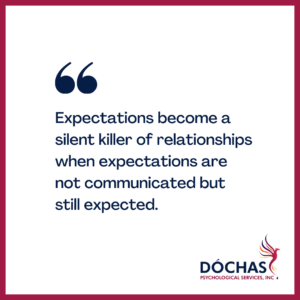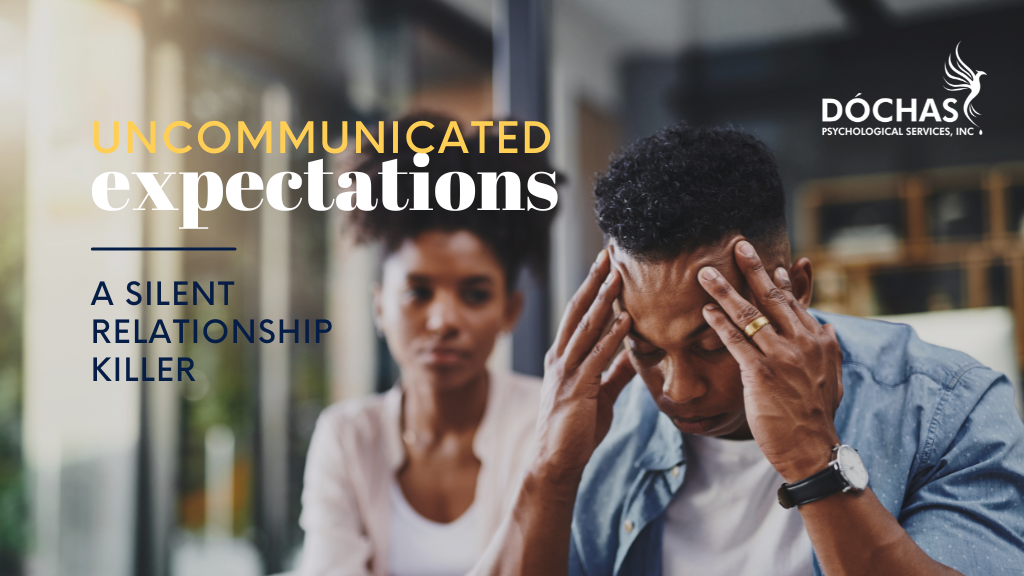It’s okay to have expectations in a relationship. But they become a silent killer of relationships when expectations are not communicated but still expected—and this is called uncommunicated expectations. It’s Stacey on the Dóchas blog today, and I’m going to talk about this and some dos and don’ts.
Here’s what uncommunicated expectations can look like. Imagine for a second that I wanted my partner to inquire about how my day was on a daily basis. From my perspective, this is normal relationship etiquette I should not have to ask for. So when this does not happen daily, I begin to build resentment and anger toward my partner. He can feel my resentment and anger but has no idea what he has done.
The mistake here is assuming the partner shares the same views on asking how each other’s day was. Expectations—especially important ones—should be communicated early on. Creating space to communicate expectations and viewpoints, will aid in avoiding discrepancies.
So, let’s talk about healthy communication.
 DO:
DO:
- Be mindful of the time and space you choose to communicate. Ideally, communicate when you are alone, without the possibility of distractions. Example: You should not be multi-tasking or tired.
- Discuss only one topic at a time. Be specific when explaining your viewpoint.
- Remember to use “I” statements rather than “you” statements. Beginning a sentence with the word “you” can create feelings of blame and defensiveness. For example: “I feel hurt when we don’t ask about each other’s day,” rather than, “You never ask me about my day. You just don’t care enough”.
- Be respectful.
- Think about your words. Be positive. If you need to, take a pause before you speak.
DO NOT:
…Interrupt
…Offer solutions or problem-solve rather than listen
…Judge, blame, criticize, or moralize
…Name call or put down
…Ask excessive questions
How to Ensure an Understanding
Hopefully these dos and don’ts give you a good starting point for communicating. But once you’ve communicated, you still want to make sure you both understand each other. Here are some tips on how to check in about that.
- After you explain your viewpoint, ask the person you are communicating with to give their understanding of what you just explained
- If they explained your viewpoint the way you intended and seem to have comprehended what you communicated, great! If not…
- Explain your viewpoint again in a way that may provide more understanding or insight and have the other person explain their understanding again. Go through this process until an understanding or comprehension is met.
How to Listen Attentively
Communication flows both ways, and that means listening skills are just as important as communication skills. Here are some tips to remember when listening.
- Look at the person you are communicating with.
- Be encouraging. For example, nod your head, or say “yes” or “hmm.”
- Have patience without interruption.
- Reflect back on the emotions or meaning, saying, for example, “It sounds like you are frustrated.”
- Lean toward the other person in a relaxed manner, rather than turning away and staying rigid.
 I hope this gives you a start on building healthy communication habits and avoiding uncommunicated expectations! If you want further practice or guidance feel free to book an appointment and we can chat in person. Reach out to us here at Dóchas by giving us a call at 780-446-0300 or by email at info@dochaspsych.com. We can give you a hand as you navigate these feelings.
I hope this gives you a start on building healthy communication habits and avoiding uncommunicated expectations! If you want further practice or guidance feel free to book an appointment and we can chat in person. Reach out to us here at Dóchas by giving us a call at 780-446-0300 or by email at info@dochaspsych.com. We can give you a hand as you navigate these feelings.
About Dóchas Psychological
Dóchas Psychological Services is a well-established and trusted therapy clinic located in Spruce Grove, Alberta. At Dóchas we value the idea that everyone deserves a safe space. Through connection and education, our team works hard to build a trustworthy relationship with each of our clients. It is our goal to create a community for our clients to feel like they belong.
Disclaimer
Information provided through Dóchas Psychological Services blogs or vlogs is meant for educational purposes only. They are NOT medical or mental health advice. You can read more about our disclaimer here.








